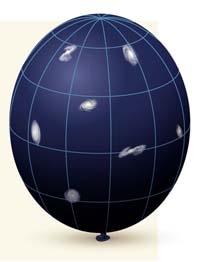Given the difficulty of quantum theory, the last post has generated an unusually high level of interest in a short time, both in comments and hits. I surmise that it’s fascinating because it’s fundamental, rather than that the OP was world-changing. I want to reflect on just a couple of thoughts arising from the generalities of the subject, rather than the valuable and serious discussion of our more erudite readers on that thread. My prompt is the article on “qbism” referenced by pngarrison in his post, which opens up again one of the ways that “mind” seems (like King Charles’s head in Mr Dick’s Memorial) to keep impinging itself on the very nature of the quantum world.
Just two observations to toss around here. The first is that, whatever quantum mechanics is truly about, it is God’s quantum mechanics, and so the process implied by Genesis 1 must never be misunderstood as simple, though the world around us has a relatively simple “interface” for us biological organisms. The second is that, one way or another, created mind (that is, us as well as God) is apparently deeply implicated in quantum reality – and yet all but a relatively few minds have absolutely no conception of what that level of reality is about, let alone how our minds relate to it.
That latter point is surprising, when you think of it, both biologically and theologically. When all is said and done, our minds are the subjective filter of all our experience, and they work for the most part in a classical and commonsense way. It’s astonishing that we can reach beyond the daily world of food, family and Euclidian space (that is, your local neighbourhood) to consider the inner workings of the world at all, an ability which has long been seen as evidence that we share some analogy of God’s reason. We tend to understand nature’s ways, however, by analogy with our everyday world. The universe is an inflating balloon, and gravity a space-time trampoline. Only an elite can master the higher symbolic language of maths to analogise things more adequately. An even smaller elite can get their heads around the very non-classical concepts in fundamental physics: consider how self-effacing many of us commenting here have been about quantum mechanics, though (myself excluded) there are plenty of good scientific credentials flying around.
Yet I take it that, if “mind” is a fundamental principle in that world, it isn’t just those elevated minds involved in two-photon experiments or quantum theorising, whose combined effect on the universe, numerically speaking, is diddly-squat. Somehow this influential “mind” must include you, your grocer, the hoodies selling dope on the corner… and maybe even, given our rather undefined conception of what “mind” means in this context, your dog deciding whether to chase the cat next door.
As an aside on that, it occurred to me that the usual comparison of cell biology with computing may be largely an artifact of DNA’s discovery in the digital age. Our minds are not Turing machines computing algorithms, and neither are animal brains, so aren’t genetic and evolutionary mechanisms more likely to be analogous to biological decision-making than digital algorithm processing? If we should be looking for genetic minds rather than genetic algorithms things might get a bit intractable – but qbism and other views of fundamental physics, as we have seen, are involving minds, not computers. Who said teleology has no place in science?
Back on the main subject, then, it is simple minds that are affecting reality if minds have any fundamental role in physical creation at all, so it seems legitimate to draw out a simple spiritual lesson. If our daily lives are intertwined with the inanimate world in ways none of us understands and few even consider, then we should maybe be less surprised by some of the paradoxes in our faith. I speculated about human freedom and God’s determination of events in the previous post, but such specific (and of course deniable) hypothesising aside, one can make some general observations. If God’s physical creation is actually fundamentally queer, spooky, counterintuitive and also incomprehensibly tied up with our minds, then I for one expect there to be some paradoxes at the junction between God’s reality and ours that are indissoluble at a “classical” level, freedom and divine determination being one of them. It would be over-egging the pudding to say such problems are explained by quantum mechanics, but they are likely to be fully resolveable by nothing less deep.
Yet remember that the minds we all have were given by God to use, even in our worship and theology, using the world’s “classical” interface of perceived reality and everyday language. It’s no failure or aberration that we were created to relate in that way to reality. So maybe, in that world, the paradoxes ultimately have to be held in tension. “God predetermines, but we act freely” is not then a contradiction but a scriptural tension. Likewise “chosen by grace” and “come all who are thirsty.” And there are many others – only provided they are paradoxes inherent in revelation, and not of our own making. The idea that “God leaves creation autonomous, but its outcomes are his” arises from human theological invention, and is contradictory rather than paradoxical.
So next time anyone asks you how a God of love could judge people we like, just answer, “It’s yer actual quantum entanglement, isn’t it?” Well, on second thoughts maybe that’s a little too simple-minded.




I still think that rationality and consistency and causality and substance (etc.) have a lot going for them, and so we should not too readily allow ourselves to be satisfied with paradoxes. Not least, despite what Jon says, they are often not readily distinguished from contradictions. We just have to keep trying to understand the ways of God with the rationality that he is in the (gradual) process of giving us.
I don’t actually disagree Ian, especially in theological mode where I’m keen to reduce conceptual conflicts to the minumum. Epistemologically it can be hard to distinguish a paradox from a contradiction, but there clearly is a difference. However, it does seem to me that there are certain paradoxes which, inevitably, we have to live with for now – some maybe for as long as this age remains, almost axiomatically if we accept that God’s ways are higher than ours.
As a working principle, I’ve come round to thinking that in those cases where Scripture itself sets up the paradox and leaves it hanging, there is probably a good reason. That’s not to say that the business of attacking such paradoxes rationally is not worthwhile – just that it needs to be as modest and provisional as possible.
Slightly off topic Jon, but in the spirit of these discussions, I suppose that when we immerse ourselves into the depth(s) of quantum theory(s), we may blur the distinction between experiential knowledge from what we generally consider scientific and testable. Generally, we may ask, “How does science manage both to make nature intelligible and to make us believe in its own effectiveness? Some consider this a complex interplay of theory (natural philosophy) and instrumentality. But a large portion of human understanding is experiential, as shown by the arts, humanities, and mixtures of testable views and human experience as found in the Social Sciences.
A relation imo exists between an epistemic agent and the object of belief. Such a general approach renders the world as containing possibilities and the agent or human being as accessing a portion of such possibilities with a relative degree of its total truth content (Kantian manifold comes to mind). Science would access a given portion of this reality and by using ideas and method (instruments) assesses its knowledge and confer various degrees of confidence to what it articulates. History of science shows that science more often than not, operated with false or inadequate ideas (such as the theory of aether for magnetism, theories on heat, theories of acids and basis). The credibility conferred to scientific views is based on the ability to test various aspects of theory, and to develop scientific thinking using experimentation, but above all a willingness to realize and acknowledge any defects, falsehood and inadequacies in its knowledge. This ethical basis for science is its strength, but the utilization of scientific knowledge (the major ‘force’ nowadays in almost every area of human endeavor, particularly military and wealth creating activities), has caused science to fall short of its ethical basis.
GD
I’ve been tossing Michael Polanyi’s name into the blog for a week or two without doing real justice to his thought, and I don’t think I could do a review of my current reading, Personal Knowledge, without reading it again and marking it up, and it was tough enough first time through.
Suffice it to say that he deals with the issues you raise in depth, whilst challenging the positivist ideal of “objective knowledge” in relation to science, including evolution, but also in relation to ethics, politics, public policy and, indeed, all the areas where our full humanness is downplayed even now.
At the same time, pace Ian’s comment on QBism in the last thread, he does not abandon scientific realism, which is why he distinguishes his term “personal knowledge” from “subjective knowledge”. In the societal setting, positivism is still rife in science – I fielded some of this stuff last night with a physicist in my saxophone group (!) and he looked scandalized at the idea of challenging the objectivist stance, having no idea it might be deficient.
Yet trendy postmodernism, in rejecting rationalism, has replaced it with radical subjectivism – and so I think Polanyi provides a currently much needed middle way. Highly recommended – I’ll put a link on the book page (and you can review it!
Do you have the link? I only have one reference to him, but I like what I read, e.g.
“The experimenter imposes restrictions on nature in order to observe its behavior under these restrictions, while the constructor of a machine restricts nature in order to harness its workings. But we may borrow a term from physics and describe both these useful restrictions of nature as the imposing of boundary conditions on the laws of physics and chemistry.”
Great stuff! Human agency is implied directly by ‘imposing’.
Right – I’ve linked to Amazon UK on the book page now, but here’s a duplicate.
Jon, I have come across a web site that is of the Polanyi society, and a great deal of material can be found there. I have read a bit more from him and find it very interesting and thought provoking – he is a significant intellect – I do not think that I can review and appreciate fully his work for some time, but I am sure we will have cause to mention him again. I may find time to read his book, but not for some time.
I’ve agreed with pretty well everything I read by him except (a) his stuff on emergence and (b) the things I can’t understand!